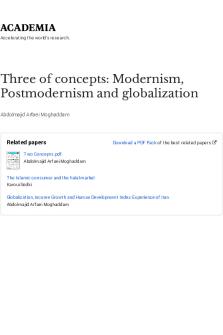Modernism PDF

| Title | Modernism |
|---|---|
| Course | introduction to english |
| Institution | Hunter College CUNY |
| Pages | 2 |
| File Size | 63 KB |
| File Type | |
| Total Downloads | 10 |
| Total Views | 127 |
Summary
modernism topic homework...
Description
Modernism Morning at the Window T. S. Eliot - 1888-1965 They are rattling breakfast plates in basement kitchens, And along the trampled edges of the street I am aware of the damp souls of housemaids Sprouting despondently at area gates.
The brown waves of fog toss up to me Twisted faces from the bottom of the street, And tear from a passer-by with muddy skirts An aimless smile that hovers in the air And vanishes along the level of the roofs.
Analysis:
Eliot’s poems reflect his perception of life right before World War I. His literary works display realistic and common themes such as depression and human isolation. One of his famous pieces, “Morning at the Window displays miniature observations and problems with modern urban life such as poverty. The speaker is standing at the window of a house in an area that the poor people may live in. Eliot doesn’t directly say anything about the impoverished area but describes what he sees and plants images that hint towards the poor conditions of the area. The line “They are rattling breakfast plates in basement kitchens...” brings to mind the image of the poor people and how it was an obligation for them to wake up really early to eat breakfast so that they could go out and then work until late at night. This poem was written right after the industrial revolution where people would work under harsh conditions in factories for very long hours to make enough to survive. The speaker seems to go along and look further away towards the “brown fog” which represents the polluted air. The “twisted faces” are those of overworked and depressed people who walk by. This poem by E.T Eliot highlights many of the problems that the people who lived in poor conditions had to face....
Similar Free PDFs

Modernism
- 2 Pages

European Modernism
- 46 Pages

Notes ON Modernism
- 3 Pages

Summary - Peter Childs: Modernism
- 32 Pages

Post-Impressionism to Modernism
- 3 Pages

Modernism- Peter Childs
- 20 Pages

Modernism and Gender
- 1 Pages

Literary Modernism in our time
- 3 Pages

Post Modernism “You Fit Into Me”
- 3 Pages
Popular Institutions
- Tinajero National High School - Annex
- Politeknik Caltex Riau
- Yokohama City University
- SGT University
- University of Al-Qadisiyah
- Divine Word College of Vigan
- Techniek College Rotterdam
- Universidade de Santiago
- Universiti Teknologi MARA Cawangan Johor Kampus Pasir Gudang
- Poltekkes Kemenkes Yogyakarta
- Baguio City National High School
- Colegio san marcos
- preparatoria uno
- Centro de Bachillerato Tecnológico Industrial y de Servicios No. 107
- Dalian Maritime University
- Quang Trung Secondary School
- Colegio Tecnológico en Informática
- Corporación Regional de Educación Superior
- Grupo CEDVA
- Dar Al Uloom University
- Centro de Estudios Preuniversitarios de la Universidad Nacional de Ingeniería
- 上智大学
- Aakash International School, Nuna Majara
- San Felipe Neri Catholic School
- Kang Chiao International School - New Taipei City
- Misamis Occidental National High School
- Institución Educativa Escuela Normal Juan Ladrilleros
- Kolehiyo ng Pantukan
- Batanes State College
- Instituto Continental
- Sekolah Menengah Kejuruan Kesehatan Kaltara (Tarakan)
- Colegio de La Inmaculada Concepcion - Cebu






